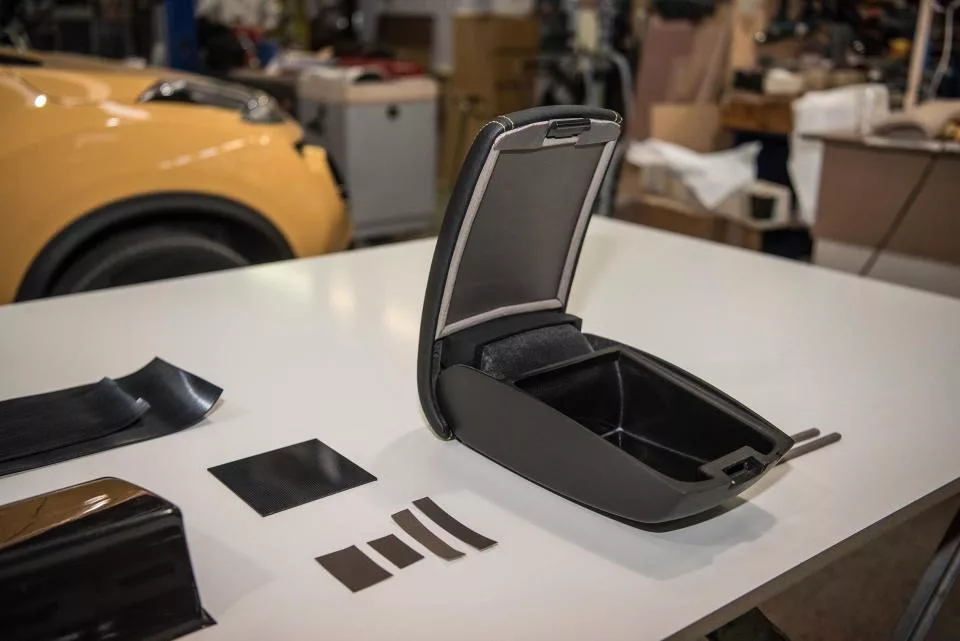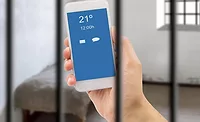Nissan Develops Mobile Phone 'Prison'

Japanese car-maker Nissan has come up with a new concept that could reduce the rate of illegal phone use while driving.
The Nissan Signal Shield is a prototype compartment that is lined with a metal Faraday cage.
Once a mobile device is placed in the compartment and the lid closed, the Nissan Signal Shield creates a ‘silent zone’, blocking all of the phone’s incoming and outgoing cellular, Bluetooth and Wi-Fi connections.
Nissan said the concept is designed to provide drivers a choice about whether to eliminate the distractions caused by the millions of text messages, social media notifications and app alerts that are ‘pushed’ to smartphones each day.
If drivers want to listen to music or podcasts stored on their smartphone, they can still connect to the car’s entertainment system via the USB or auxiliary ports. The device will maintain wired connectivity even when in the Nissan Signal Shield compartment.
The innovation works on the principle of the Faraday cage, an enclosure made of a conductive material, such as wire mesh, which blocks electromagnetic fields. It is named after the pioneering English scientist Michael Faraday, who invented it in the 1830s.
When an electronic device, like a smartphone, is placed inside, any incoming electromagnetic signals – such as cellular or Bluetooth data – are distributed across the cage’s external conducting material and so prevented from reaching the device.
Alex Smith, Managing Director, Nissan Motor GB Ltd. said; “Nissan produces some of the safest cars on the road today, but we are always looking at new ways to improve the wellbeing of our customers. Mobile phone use at the wheel is a growing concern across the automotive industry, and indeed society, particularly with the high number of ‘pushed’ communications, such as texts, social media notifications and app alerts that tempt drivers to reach for their devices.”
“The Nissan Signal Shield concept presents one possible solution for giving drivers the choice to remove all smartphone distractions while driving. This is about delivering more control at the wheel, not less. Some drivers are immune to the activity of their smartphone, but for those who struggle to ignore the beeps and pings, this concept provides a simple solution in this very ‘connected’ world we live in.”
A U.S study of more than 1,000 drivers in 2014 found that 98% agreed it was dangerous to text and drive, but 74% claimed they had done so with 30% saying it is ‘simply a habit’ because they are so used to being connected to their phone, and they believed their driving performance was not impacted by texting.
Dr. Greenfield, founder of The Center for Internet and Technology Addiction and Assistant Clinical Professor of Psychiatry at The University of Connecticut School of Medicine, who worked on the report, said, “We compulsively check our phones because every time we get an update through text, email or social media, we experience an elevation of dopamine, which is a neurochemical in the brain that makes us feel happy. If that desire for a dopamine fix leads us to check our phones while we’re driving, a simple text can turn deadly.”
Research by Nottingham Trent University found that the average user checks their phone 85 times a day and that 'rapid mobile phone interactions', less than 30 seconds, are becoming habitual for smartphone users, with many not realizing the frequency with which they check their phone.
Young drivers in particular are more likely to be distracted. Just less than half of drivers (49%) aged 25–34 admitted they sometimes go online or use apps while driving. Almost a third of drivers in the same age group said they do this several times a week at least.
Looking for a reprint of this article?
From high-res PDFs to custom plaques, order your copy today!



